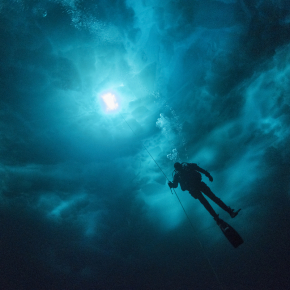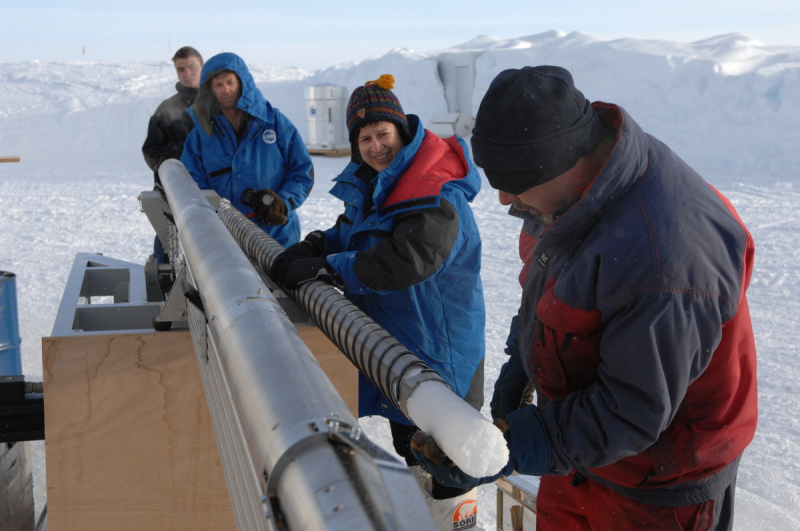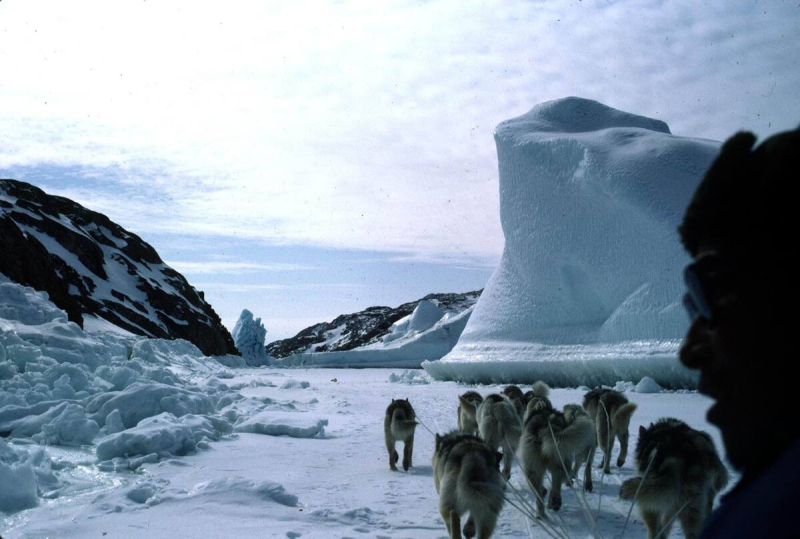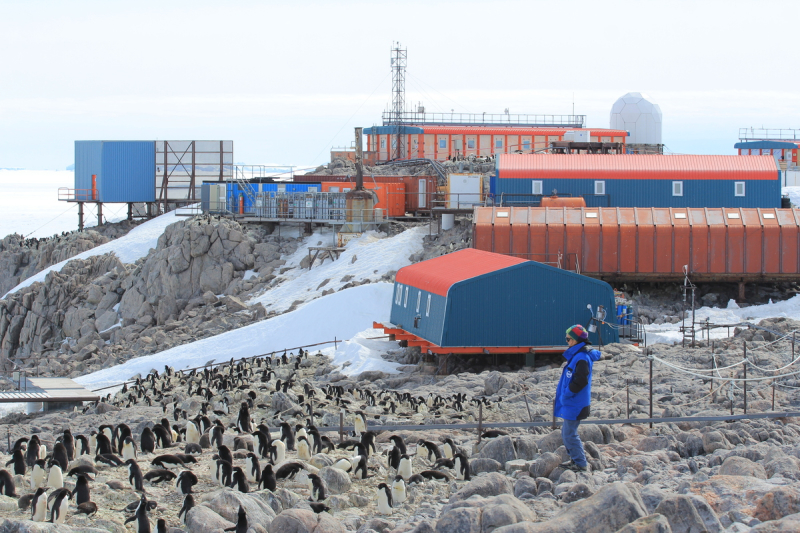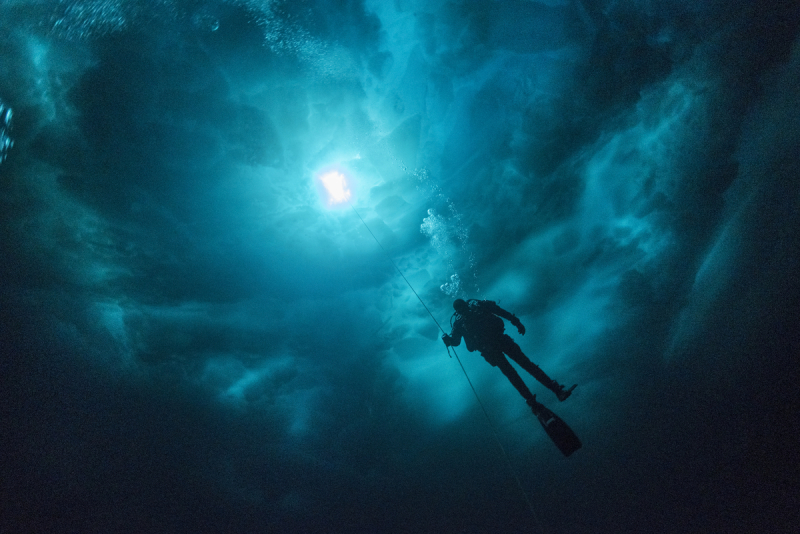France at the heart of worldwide polar research
At UNOC-3 the first deliverable from the Climate, Biodiversity and Sustainable Societies programme agency assigned to the CNRS was presented – a foresight study of French polar research.
The programme agency you direct has just published a foresight study on French polar research. Why was this chosen as the agency's first deliverable?
Elsa Cortijo1 : In 2022, Olivier Poivre d'Arvor, France's ambassador for the poles and oceans, presented France's first polar strategy to President Emmanuel Macron. This document featured an estimated figure of €1 billion required as France's investment in the poles between now and 2030. This budget provided for 100 million euros to support research as well as specific infrastructure plans like building a new French Pacific-Antarctic semi-submersible vessel, the Michel Rocard, the reconstruction of the Dumont-d'Urville station on the Antarctic Peninsula scheduled to start in 2026 and the renovation of the Franco-Italian Concordia station.
Subsequently, at the One Planet Polar Summit in November 2023, Emmanuel Macron announced the launch of an East Antarctic research programme which the scientific community had been strongly calling for. Following on from this, a few months after the creation of the programme agencies in mid-2024, the French Ministry of Higher Education and Research asked us to work on a scientific polar foresight study, the research complement to the overall polar strategy. In practical terms, the aim of this foresight research is to translate the polar strategy's ambitions into tangible research guidelines centred on a coherent interdisciplinary programme geared towards international cooperation.
- 1Executive director of the Climate, Biodiversity and Sustainable Societies programme agency.
For this first deliverable, the agency was the contracting authority and assigned the project to the CNRS's, Earth & Space Institute, working in association with all the agency's partners involved in polar research (the CEA, the Ifremer, the MNHN1 and several universities). 10% of the CNRS's jointly supervised research units are involved in polar research and the organisation accounts for 70-80% of French publications on the poles. These figures make the CNRS the French research organisation with the most strengths in this field and also the organisation with the second most publications on the polar regions in the world.
What are the foresight study's main conclusions?
E. C.: The report published today at the Third United Nations Conference on the Oceans (UNOC-3) in Nice presents a structuring polar research programme developed by the national scientific community. It's an interdisciplinary programme covering the three polar regions – the Arctic, Antarctic and sub-Antarctic – and the whole polar socio-environmental system (see box below). This approach dovetails with strong international cooperation initiatives like the Decade of Action for Cryospheric Sciences (2025-2034) launched by Unesco, the international Antarctica InSync programme2 (2027-2030) and the International Polar Year 2032-2033 in the longer term. This is a unique opportunity for France to make an essential contribution to international polar research efforts. In fact, as France is of course a non-polar nation, research remains our entry point to geopolitical discussions on these regions.
- 1French Alternative Energies and Atomic Energy Commission (CEA), French Research Institute for Exploitation of the Sea (Ifremer), National Museum of Natural History (MNHN).
- 2The aim of the Antarctica InSync international research programme (2027-2030) is to study the links between the atmosphere, ice, ocean, climate, environment and the living sphere, including the effect of human-caused pressure, in Antarctica and the Southern Ocean.
15 scientific challenges and major investments: priorities for polar research
The Arctic is warming almost four times faster than the global average with glaciers melting in the Antarctic, viruses reaching sub-Antarctic regions and so on. "The poles are both the sentinels and drivers of the climate, and what goes on there has consequences for local and global ecosystems and populations", explains Gaël Durand1 , the coordinator of the polar foresight study project. This report resulted from collaborative work involving 20% of the scientific community in this field and has "identified the French scientific community's strengths and priorities". It sets out 15 interdisciplinary scientific challenges linked to the three major polar regions along with a number of technical, methodological, logistical and diplomatic challenges like the development of instrumentation, digital tools or access to the poles. "The major scientific questions develop at the interfaces between disciplines and what's happening in the Arctic provides us with information on the Antarctic so basically we need to decompartmentalise both research and the regions. This overall vision is based on an integrated and global scientific approach that takes the whole socio-environmental system into account. It'll help us find out more about changes at the poles to anticipate them better", explains the coordinator who also warns that "we'll need human and financial resources to put these research priorities into action".
- 1CNRS research professor working at the Institute of Environmental Geosciences (CNRS / INRAE / IRD / Université Grenoble Alpes) and scientific polar affairs delegate for at CNRS Earth and Space.
What are the agency's next projects after this first deliverable?
E. C.: Two other subjects are being launched currently. The first is being collectively dealt with by the 'Agralife' programme agency, led by the INRAE1 , and also the 'Health' programme agency, led by the Inserm2 , and concerns the One Health theme3 , particularly as there's an international summit to come soon. We have chosen to concentrate on two aspects of this vast subject – the crucial issue of data and the question of France's overseas territories which are on the front line of environmental change. The three programme agencies have asked the National Agency for Food, Environmental and Occupational Health Safety (Anses) to steer the project.
- 1National Research Institute for Agriculture, Food and Environment.
- 2French National Institute of Health and Medical Research (Inserm).
- 3This concept aims to highlight the relationships between human health, animal health and ecosystems, and to make the link between ecology and human and veterinary medicine.
The second subject is human intervention in the climate which people will perhaps know better as 'geoengineering'. Given the difficulty of drastically reducing greenhouse gas emissions despite the efforts that have already been made – which of course need to be continued – like the idea of implementing specific technologies in this area is gaining support. These aim to remove CO2 from the atmosphere, for example by increasing the oceans' rate of carbon absorption through the 'carbon dioxide removal' (CDR) strategy or to modify the planet's radiation balance1 to prevent overheating by sending aerosols into the atmosphere in a process known as 'solar radiation modification' (SRM). CDR and SRM involve several technologies that are currently essentially immature, sometimes border on science fiction and would require an immense level of investment. Also, several of them may potentially be dangerous which concerns the scientific community and requires specific research.
There is much division between countries and among scientific communities on the issue of climate intervention. Some call for a moratorium while others are increasingly considering these technologies as ways of combating climate disruption, following the example set by the United Kingdom which just launched its first call for projects on SRM. These questions are also being raised within the IPCC, which is deliberating whether to include some of these technologies in work on its seventh report scheduled for publication by the end of the decade. This means our work supported, among others, by the Ministry for Ecological Transition, Biodiversity, Forestry, Sea and Fisheries, has a complex overall context and will aim to produce a national roadmap from a European perspective.
These two new subjects are at the interface of research and civil society issues and are core topics for our programme agency.
- 1The radiation balance compares the energy reaching the Earth's surface with the energy the planet re-emits.
